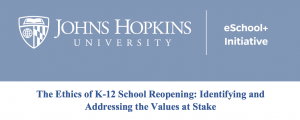The national conversation about how to reopen schools is in full swing. It is likely that this conversation will continue throughout the 2020-2021 school year, as the epidemiology of the pandemic shifts and evidence about the SARS-CoV-2 virus and COVID-19 disease accumulates. Markedly absent from this conversation is a sustained discussion of the ethics of school reopening. Many states and a number of non-governmental organizations have provided guidance on the challenges schools will face as they reopen their doors. Most of these documents focus on the public health accommodations needed for the return to school, including cleaning regimens, social distancing, and contact tracing. Some briefly consider a few ethics issues, including most frequently inequitable access to technology, differential learning loss for various groups of students, and also occasionally accommodations for at-risk teachers and administrators. However, most of these plans fail to examine in any depth, and in some cases even fail to mention, many of the ethical issues that are at the crux of a safe and equitable return to school for all students, staff and parents.
The White Paper on the Ethics of K-12 School Reopening is intended to help fill this gap. Building on the Johns Hopkins Berman Institute of Bioethics’ Ethics Framework for the COVID-19 Reopening Process, we frame school re-opening around four broad moral values—well-being, liberty, justice, and legitimacy—and how policies under consideration can promote or undermine these moral values. This document does not aim to analyze the ethics of specific policies. Rather it aims to put a spotlight on ethical issues using a structure that allows us to identify and outline the explicit trade-offs at stake, and help make decisions that take into account collective societal values. (Additional resources to assist decision makers in addressing the ethics of school reopening are described in the appendix.)
